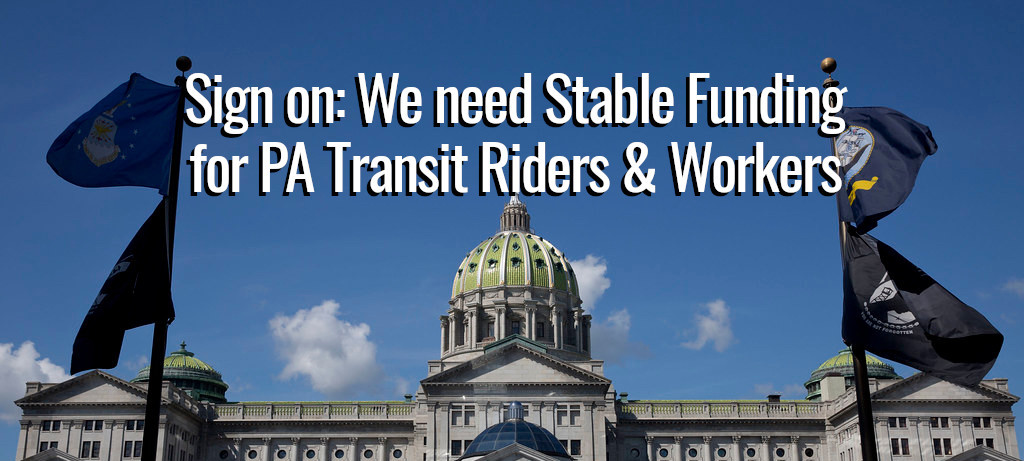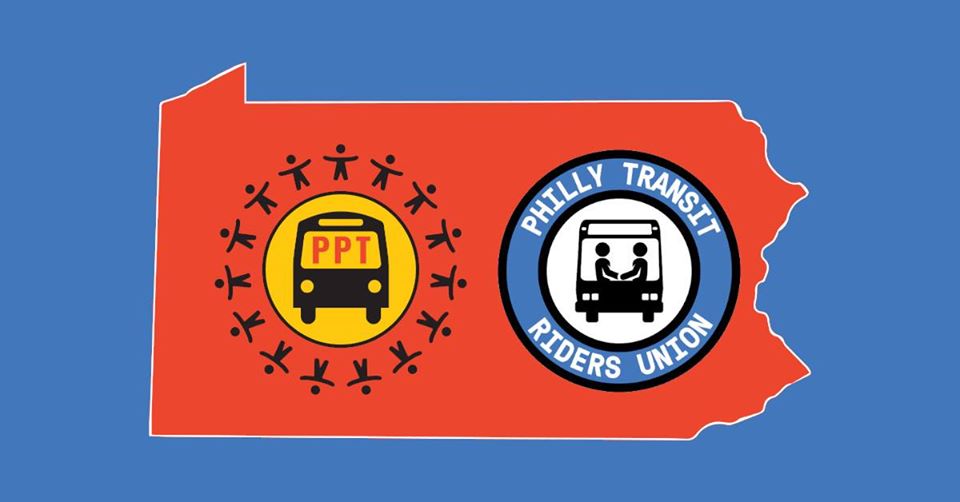
Transit is essential. Pennsylvania needs stable funding for public transit.
On Thursday, May 14th, 82 organizations, unions, and elected officials across the state of Pennsylvania called on state legislators to ensure that the PA Turnpike fulfills its $450 million transit funding obligations until 2023, or until a sustainable, dedicated alternative funding source is secured. This coalition of transit riders, labor unions, community development corporations, and community advocates recognize that the viability of our transit system is paramount to both survive the pandemic and to ensure a path forward to recovery.
Recent news reports suggest that the Turnpike is looking to discharge this obligation amid the pandemic, and proposed state legislation would begin that process, with no plan for replacement. Defunding mass transit would impact residents in every county across the State. It would bring the state economy to a grinding halt and diminish access to critical needs like food and healthcare at a moment when both are precarious.
Moreover, COVID-19 CARES Act transit funding must not be used to replace the annual state contribution for transit, as it was specifically intended by Congress to address increased costs and funding shortfalls of transit agencies during COVID-19, and to ensure that mass transit could continue to serve as the economic engines of our cities. Finally, it is egregious that transit agency board members of both SEPTA and the Port Authority of Allegheny County are in positions that allow them to defund our transit systems, and undermine the viability of these economic drivers and community lifelines.
Testimonials from Pennsylvania transit riders supporting this effort:
- Tara Taylor, SEPTA Transit Rider
- Dick Furstein, SEPTA Transit Rider
- Chris Chirdon, Port Authority Transit Rider
The full letter and signatories are copied below and sign on to stay abreast of statewide advocacy for public transit:

Dear Governor Wolf and the PA Senate and House Appropriations and Transportation Committee Members,
Public transit is a public utility, and an essential extension of our healthcare and food systems. The COVID-19 crisis has brought into stark relief the need for public transit systems to be considered essential services and as a necessary aspect of our healthcare and food system infrastructure. Public transit moves front line workers in our food and healthcare industries to their critical jobs — nurses, grocery and pharmacy clerks, hospital environmental service workers, pharmacy technicians, food warehouse workers.
We the undersigned stakeholders and community organizations would like to respond to recent news reports and legislation proposing the discharge of the Turnpike responsibility to fulfill its transit funding obligations under Act 89. These reckless proposals would impact residents in every county across the State. Defunding transit would bring our state economy to a grinding halt and diminish access to critical needs like food and healthcare at a moment when both are precarious. The CARES Act COVID-19 transit funding was provided with the intention of ensuring the safety and viability of our mass transit during this crisis, and under no circumstances should it be used to justify dismantling our state funding mechanisms.
While Act 89 was an imperfect solution to the lack of dedicated funding to transit, it was nonetheless a heroic bi-partisan effort that provided stability for our Cities and rural communities and kept our statewide economy moving. That $450 Million annual Turnpike obligation does not step down until 2023. Our state legislators cannot allow for a reduction or for the elimination of those payments until an equivalent or greater dedicated state transit funding source is identified.
The federal government has responded to this crisis with bold action, directing emergency stimulus funds to transit agencies so that they can continue operating as economic engines of our states. Our federal legislators have recognized that maintaining the sustainability of our transit systems is paramount to both surviving the pandemic and ensuring a path forward to recovery. This CARES Act transit funding should under no circumstances be considered a viable substitute or stopgap for the state funding obligation, and must not be co-opted to address Turnpike shortfalls. The feds have done their part, now the onus is on our state.
Our state legislators need to rise to the urgency of this moment. This cannot be done by following the path set forth by Senator Kim Ward’s legislation or Representative Lori Mizgorski’s legislation, which would defund our state’s public transit systems with no plan for reliable, long-term replacement. Representative Mizgorski’s proposals are particularly egregious as she is a Board Member of the Port Authority of Allegheny County, with a responsibility to keep the transit agency financially solvent so that it can fully serve its riders and our regional economy. Her transit-riding constituents deserve better. PA residents deserve better. She and other legislators must take proactive steps to ensure public transit can continue to serve our state economy.
Pat Deon, Chairman of the Board of the Southeastern Pennsylvania Transportation Authority, is also a Pennsylvania Turnpike Commissioner, which places him in a uniquely compromised position. Chairman-Commissioner Deon must recognize that extricating the Turnpike from its financial obligations cannot be prioritized ahead of the critical mass transit systems that riders across the state count on every day.
If under this worst case scenario, the Turnpike reduces its transit payment obligation, then we propose that the Motor License Fund cover the shortfall. The Motor License Fund was intended to ensure the safety and viability of our state transportation system. However, over the past seven years, the State Police have siphoned billions of dollars from this fund. Annually, they have taken nearly twice as much money as the Turnpike funding that is allocated to mass transit. There is broad, bi-partisan agreement that the Motor License Fund is not the appropriate mechanism to fund the state police, particularly because their allotment far exceeds the amount needed to pay for the state troops which patrol our highways. Now is the moment for that change.
With this letter, we implore Pennsylvania Legislators to take innovative, equitable approaches to establish dedicated, long-term funding for public transit.
Sincerely,
Pittsburghers for Public Transit
Philly Transit Riders Union
Transport Workers Union Local 234
Amalgamated Transit Union Pennsylvania Joint Conference Board
Amalgamated Transit Union, Local 85
Amalgamated Transit Union, Local 164
Amalgamated Transit Union, Local 168
Amalgamated Transit Union, Local 241
Amalgamated Transit Union, Local 801
Amalgamated Transit Union, Local 880
Amalgamated Transit Union, Local 956
Amalgamated Transit Union, Local 1279
Amalgamated Transit Union, Local 1345
Amalgamated Transit Union, Local 1436
Amalgamated Transit Union, Local 1738
Amalgamated Transit Union, Local 1743
Amalgamated Transit Union, Local 1958
Commuter Railroad System Division / Brotherhood of Maintenance of Way Employes Division of the International Brotherhood of Teamsters
SEIU 32BJ
SEIU Healthcare PA
United Electrical Workers (UE)
Lindsey Williams, PA State Senator, District 38
Sara Innamorato, PA House of Representatives, District 21
Anita Prizio, Allegheny County Council, District 3
Bethany Hallam, Allegheny County Council, At-Large
Olivia Bennett, Allegheny County Council, District 8
Darwin Leuba, Auditor of O’Hara
1Hood Media
350 Philadelphia
ACCESS Mob
Allegheny County Transit Council
Alliance for Police Accountability
ARYSE
BikePGH
Bloomfield Development Corporation
Bloomfield Garfield Corporation
Borough of Carnegie
Casa San Jose
City County Taskforce on Disabilities, Allegheny County
Clevelanders for Public Transit (CPT)
Coalition of Labor Union Women (CLUW)
CREATE Lab
Delaware Valley Association of Rail Passengers
Erie United
FMB&Associates
Green Party of Allegheny County
Green Party of Pennsylvania
Hill District Consensus Group
Human Rights City Alliance
Institute for Policy Studies Climate Policy Program
Izaak Walton League of America – Allegheny Chapter
Just Harvest
Labor Council for Latin American Advancement (LCLAA)
Labor Network for Sustainability
Lawrenceville United
New Sun Rising
New Voices for Reproductive Justice
North Aiken Community Council
OnePA
Perry Hilltop Citizens Council
Philadelphia Climate Works
Philly Neighborhood Networks
Physicians for a National Healthcare Program, Western PA
Pittsburgh Food Policy Council
Pittsburgh Mobile Bus Information Hotline
Pittsburgh Union of Regional Renters (PURR)
Pittsburgh United
Pittsburgh Urban Magnet Project (PUMP)
Put People First! PA
Reclaim Philadelphia
Restaurant Opportunities Center United of Pennsylvania
SEPTA Youth Advisory Council (YAC)
Sharpsburg Neighborhood Association
Sierra Club
Sierra Club Allegheny County Chapter
SisTers PGH
Somali Bantu Community Association of Pittsburgh
Sunrise Movement Philadelphia
Take Action Mon Valley
Thomas Merton Center
Three Rivers Community Foundation
Transit Forward Philadelphia
Trap Panther Party
Urban League of Greater Pittsburgh
UrbanKind Institute
Walk Bike Shaler
Washington United
Women & Girls Foundation